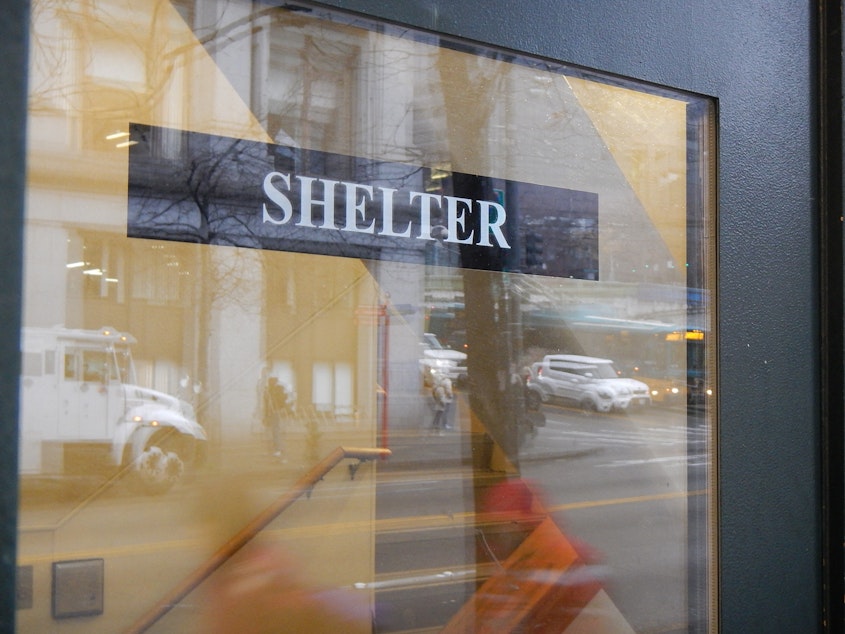Controversial regional homelessness authority plan moves forward with big changes

Legislators from across King County voted unanimously Thursday to move forward with a plan to unite Seattle and King County’s homelessness services.
The legislation to create a regional homelessness authority was passed out of the county’s Regional Policy Committee (RPC).
But it still faces hurdles. It must now go before the full King County Council and the Seattle City Council. And it’s not without controversy.
The plan advanced on Thursday has received strong pushback from some community members who object to last-minute changes made by lawmakers.
It differs from the original proposal in some key ways, including giving more power to elected officials and representatives of suburban cities.
Harold Odom is a member of the Lived Experience Coalition, a group of people who are currently and formerly homeless.
Speaking during public comment in front of the committee before the vote, he urged lawmakers to reconsider their changes.
“You spent hundreds of thousands of dollars on consultants that gave you some good recommendations,” Odom said.
Sponsored
“You spent all that money and now you’re going to change it.”
Odom said there are a record number of people dying on the streets and the current response is not getting results.
Others echoed his sentiment, arguing that the region has spent years looking for solutions and simply “re-arranging the chairs” wouldn’t cut it.
County Councilmember Jeanne Kohl-Welles defended the changes that were made, saying they had to come up with something that would actually pass.
“The county council is a regional body, it is not a city council,” she said.
Sponsored
“We had to look at what would be workable and what would be possible.”
Kohl-Welles said she feels good about the updated plan that will go to the King County and Seattle councils.
Her optimism didn’t seem to be mirrored in an afternoon meeting of Seattle city council members Thursday.
Council members present had many questions as they discussed the legislation passed out of the RPC.
Their discomfort with certain portions of the plan could indicate that the process will be drawn out into 2020, as a new wave of elected officials are taking their seats.
Sponsored
Councilmembers Lisa Herbold and Lorena Gonzalez both spoke about their concerns.
High up on their list is the shift towards granting more power to elected officials over subject matter experts.
Proponents of this change argue this makes the authority more accountable to constituents.
Gonzalez and Herbold argued the legislation passed out of the RPC could be simply creating a newer version of what is already in place.
“I just don’t want us to fool ourselves into thinking we’re doing something transformative when it appears that we’re just taking one little teeny, tiny step towards trying to do it a little different,” Gonzalez said.
Sponsored
Seattle Mayor Jenny Durkan and King County Executive Dow Constantine announced late last year that they planned to create a single, independent body to oversee the region’s homelessness response.
By combining funding and policy efforts they hoped to reduce fragmentation within the homelessness services system, which has impeded success in the region’s effort to combat homelessness.
The original proposal outlining the structure of the new regional authority was sent to lawmakers earlier this year. Consultants spent at least 18 months talking to people with lived experiences of homelessness, service providers, business groups, and other community members to inform the plan.
The updated proposal, voted on Thursday, differs from that version in several key ways.
It changes the structure from a public development authority to an independent agency with a CEO.
Sponsored
It also tilts the balance of power in the two-tiered governing structure towards elected officials who make up the 'governing committee', and away from a 13 person board of experts. And it increases representation for suburban cities.
The ‘governing committee’ of elected officials previously had limited powers. They could approve or reject budgets, policies, and things like the five year plan.
Under the updated version, officials would have the ability to amend budgets, plans and policies, as well as hiring and firing power over the authority’s CEO.
The makeup of this committee has also changed. Where the previous version gave more seats to Seattle and King County representatives, the newer version gives equal representation to Seattle, King County, the Sound Cities Association (representing cities in the county outside Seattle), and people with lived experiences of homelessness.
This has caused tension. Seattle will contribute $73 million of the new authority’s roughly $130 million budget.
By the same token, suburban cities have argued they deserve to be part of the decision making process.
“We’re not going to get anything done in helping Seattle if the rest of us in the county aren’t part of this and working together,” said John Stokes, a Bellevue city councilmember.
“We’re going to all attack this together… it’s a watershed event,” he said.
In the broader community, groups like the Lived Experience Coalition expressed frustration that they were consulted in the process of creating the initial proposal, and that proposal was not adopted.
Marc Dones is the executive director of National Innovation Service, the consulting group tasked with helping to create the initial plan.
Dones said people who gave input have every right to be upset.
“The fact that it is now being changed this way, and that they’re not being brought to the table for any of those changes, I think is striking,” they said.
Dones said the newer legislation would mechanically consolidate homelessness services, but they said it likely won’t insulate budgets and policies from political whims.
More than 11,000 people are homeless in King County, both in shelters and sleeping outside, on any given night. In 2018, 22,500 families and individuals needed help from a homeless service in the county.




